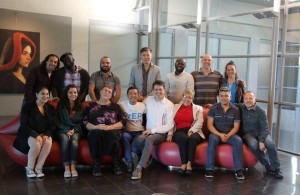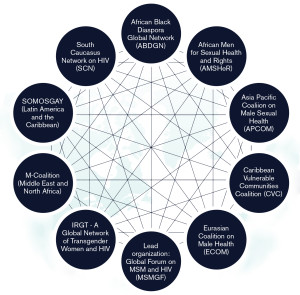Lessons Learned from a Consortium of MSM and Transgender Networks
MSMGF has announced the release of a new case study by and about the Consortium of MSM and Transgender Networks. The Consortium is an international collaborative project of ten regional and global networks of advocates[1], including MSMGF as the lead organization. The Consortium members dedicate their work to maximizing efficiency and coordinating global efforts to support the sexual health and human rights of men who have sex with men (MSM) and transgender people. Collaboration is more important than ever given decreases in available funding to advocacy groups.
“(Even) Greater Than the Sum of Its Parts: A Case Study on Working Together as the Consortium of MSM and Transgender Networks” documents the impact of the Consortium’s efforts and describes the added value of collaboration. The primary context of the case study is the Consortium’s implementation of two grants by the Robert Carr civil society Networks Fund (RCNF) over the past two years. The Case Study highlights multiple examples of how working in a Consortium has benefited member networks and MSM and transgender communities in general. Among others, these benefits include:
- Providing opportunities to strengthen the organizational capacity of member regional and global networks, and laying the foundations for strengthened advocacy
- Improving the quality of programs and advocacy for MSM and transgender communities, by streamlining communications, pooling expertise and agreeing on good practice
- Providing a stable, global platform that serves as a united front to tackle sensitive issues and hostile environments by offering credibility, legitimacy and protection to individual networks
- Facilitating joint access to funding opportunities, reducing competition and producing a more time- and cost-efficient model of grant management.

In the words of Carolyn Gomes, Executive Director of CVC (Caribbean Vulnerable Communities Coalition), one of the regional members of the Consortium:
“Consortia work is crucial in this time of reduced interest and funding in community-based efforts. It allows all the participating members to benefit from the collective expertise of the group, and raises the capacity of all members involved. That in turn allows us to be more efficient and resourceful in how we approach our work. This case study shows how we do it, and how others might also when they engage in consortia work.”
Likewise, according to George Ayala, Executive Director of the MSMGF:
“The Robert Carr Networks Fund, from Aids Fonds out of the Netherlands, is one of the few sources of financial support for consortia work. This case study can help demonstrate why consortia work is essential, and why there should be expanded interest and assistance for this approach for advocacy networks collaborating to serve key populations. We hope that this document can inspire other funders to invest additional resources to support community-led programs and interventions.”
Author: Sarah Middleton-Lee
